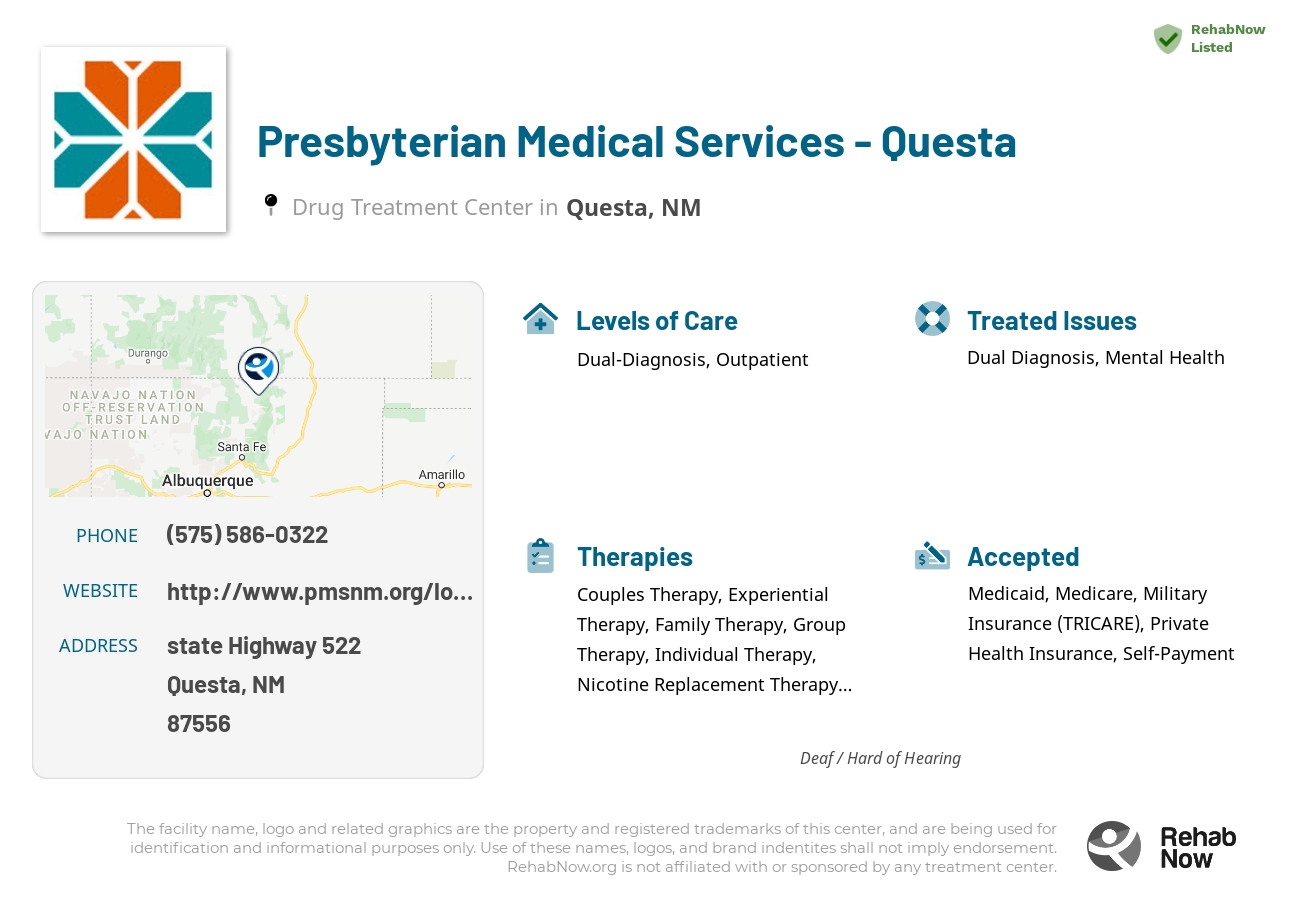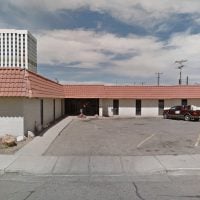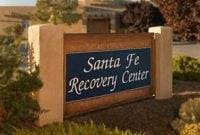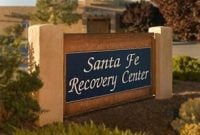Presbyterian Medical Services - Questa
Drug Rehab Center in Questa, New Mexico
Presbyterian Medical Services - Questa is a health care facility that provides medical and behavioral health applications to individuals and families in Northern New Mexico, including specialized treatment for addiction and substance abuse.
About Presbyterian Medical Services - Questa in New Mexico
Presbyterian Medical Services - Questa, located in Questa, New Mexico, is an addiction treatment facility founded in 1901. This facility specializes in providing comprehensive care and support for individuals suffering from dual diagnosis and mental health conditions. Presbyterian Medical Services - Questa primarily offers outpatient levels of care to ensure that individuals can receive the treatment they need while still maintaining their daily routines. With their commitment to personalized care and evidence-based practices, this facility strives to empower individuals on the path to recovery.
Presbyterian Medical Services - Questa provides a wide range of services and treatment methods for addiction and substance abuse. Their team of medical professionals and experienced counselors take a holistic approach to treat both the physical and psychological aspects of addiction. Through dual-diagnosis treatment, individuals with co-occurring mental health disorders can receive integrated care for their specific needs. In addition to traditional counseling sessions, the facility may offer individual or group therapy where patients can engage with each other in a supportive environment. They also offer various evidence-based treatments such as cognitive-behavioral therapy (CBT) or dialectical behavior therapy (DBT), aimed at helping individuals develop healthy coping mechanisms and interpersonal skills on their journey towards recovery. Overall, Presbyterian Medical Services - Questa prioritizes individualized care while ensuring patients have access to the necessary resources and support needed for their recovery journey.
Genders
Ages
Modality
Additional
Conditions and Issues Treated
Recovery is not simply about stopping drug use. Recovery is working with addiction while recovering mental health issues that are fueling the addiction in the first place.
Levels of Care Offered
This center offers a variety of custom treatment tailored to individual recovery. Currently available are Dual-Diagnosis, Outpatient, with additional therapies available as listed below.
Outpatient treatment is considered the lower intensity level of addiction treatment. It’s ideal for early phase addiction or lower intensity addictions. It may include weekly sessions instead of daily. It may include weekly sessions instead of daily. Peer group support, 12-step programs, and individual counseling may still be involved but at a lesser frequency than an intensive outpatient program. It is a good choice for someone who doesn’t need to go through a medically supervised detox and who has a supportive home environment. It requires motivation and dedication to commit to the program without constant monitoring.
Therapies & Programs
Individual therapy involves one-on-one sessions between the patient and therapist. It provides patients with a safe environment to openly discuss personal and sensitive issues with the therapist. They find the therapist as someone they can trust. Individual therapy aims to identify the core issues that would have led the patient to substance abuse and address them effectively. The therapist can develop patient-specific customized solutions through individual therapy, which aids speedier recovery.
Couples therapy works with clients and significant others in a professional capacity to improve relationship dynamics. This can be helpful for addicts who are trying to marry the idea of recovery into their work, family, social lives – any aspect that has to do with relationships.
Through counseling sessions, addicts will have an opportunity to talk about their addiction with professional partners. These partners can offer feedback and advice on how to get sober while keeping healthy relationships intact. A good couples therapist will help addicts understand their part in an unhealthy relationship dynamic or find ways to deal with anger or resentment from significant others outside of the home.
Family therapy is a group problem-solving that aims to improve communication and relationships between the addict, their family, and sometimes friends. The main goal of family therapy for drug addiction is to create an environment where communication can occur without judgment, hostility, or blame. The therapist is with the family as they learn to communicate differently, especially with the addict when s/he is using. The family can learn to reduce their enabling behavior or rally together and support each other during tough times.
An addict’s family can play a vital part in helping them to avoid relapse because they can spot the warning signs and help them get back on track before it becomes too much of a problem. Family therapy is one of the most effective ways to help addicts stay on the path to long-term sobriety. When a drug addict decides that they want to try and get sober, it takes the support of every person they love to succeed. It can be incredibly difficult for loved ones to watch an addict go through the pain and suffering of withdrawal, but by being there with them and supporting them, they can help to make sure that the addiction never returns.
Groups typically involve meetings with other recovering addicts who can relate to one another’s experiences. They might meet in person or online and typically focus on the process of staying sober rather than overcoming a specific addiction.
In these groups managed by Presbyterian Medical Services - Questa, addicts can build a sense of community and develop strong emotional connections with others who understand what they are going through. These beneficial relationships can help addicts overcome their cravings and prevent relapse at any point during the recovery process.
In general, trauma therapy is a clinical process that helps individuals deal with mental stress often caused by traumatic events. The therapist helps the person identify, understand, and work through the problem. This is done with the help of talking about it in group or one-on-one counseling sessions. Therapists use relaxation, role-playing, art, and music to help the person open up about what is bothering them.
There are many different types of trauma therapists, such as psychiatric nurses and counselors. Not everyone is a good candidate for this type of therapy; it is generally reserved for people who have recently experienced a traumatic event and struggle to get over it. It is often done for children, teenage victims of sexual assault, and war veterans.
There is hope for people who are addicted to drugs and alcohol. Cognitive Behavioral Therapy (CBT) is the solution. CBT focuses on the underlying thoughts and behaviors that caused the addiction problem in the first place and may cause a relapse. This type of psychotherapy addresses negative feelings common in substance abuse disorders. It helps to change them by restructuring thought patterns. It’s about removing negative thoughts and providing long-term benefits while promoting self-awareness, self-control, and healthy ways to respond to negative thoughts. These sessions can be done by themselves or as part of combination therapy.
The goal of medical nutrition therapy for drug and alcohol addiction is to help patients avoid “trigger” foods. For example, someone who craves alcohol may be addicted to sugar. Making sure this person eats a balanced diet with recommended amounts of protein, vegetables, and fruit can help manage urges to drink.
Nicotine replacement therapy treats nicotine addiction using external sources of nicotine, such as patches or gum to substitute for nicotine. This allows people trying to quit smoking to get their desired dose of nicotine without actually having to smoke cigarettes. The idea behind NRT is that by providing smokers with nicotine in forms that are not cigarettes, they may be more likely to quit smoking.
NRT has been available for many years now, and there is a wealth of evidence that shows that it helps people trying to quit smoking. There are several different types of NRT devices on the market now. Patients interested in quitting smoking should talk to their doctors about the best kind of NRT for them.
Patient Experience
Experiential Therapy at Presbyterian Medical Services - Questa
Experiential Therapy teaches people how to think differently about their lives and change their emotions by changing their behavior. This type of treatment is accomplished with various activities that may involve acting, props, arts and crafts, animal care, or other tools that may be effective.
This therapy aims for patients to release suppressed thoughts that cause bad feelings and drug addiction. Role-playing, arts and crafts, music, animal care, rock climbing, etc., are some of the activities used in this therapy. Gradually an individual will feel calmer and more loving which will change their perception positively. In addition to treating drug addiction, experiential therapy is beneficial for different behavioral and eating disorders.
Payment Options Accepted
For specific insurance or payment methods please contact us.
Is your insurance accepted?
Ask an expert, call (888) 674-0062
Presbyterian Medical Services Associated Centers
Discover treatment facilities under the same provider.
- PMS - Totah Behavioral Health Authority in Farmington, NM
- Presbyterian Medical Services - Thoreau in Thoreau, NM
- Presbyterian Medical Services - West Broadway in Farmington, NM
- PMS - Cuba Health Center in Cuba, NM
- Presbyterian Medical Services in Gallup, NM
Learn More About Presbyterian Medical Services Centers
Additional Details
Specifics, location, and helpful extra information.
Questa, New Mexico 87556 Phone Number(575) 586-0322 Meta DetailsUpdated November 25, 2023
Staff Verified
Presbyterian Medical Services - Questa Patient Reviews
There are no reviews yet. Be the first one to write one.
Questa, New Mexico Addiction Information
New Mexico has been one of the leading states in the nation when it comes to drug and alcohol use, abuse, and addiction. Opioids are responsible for over 60% of all drug-related overdoses in New Mexico. Alcohol-related deaths in New Mexico are the highest in the nation and almost twice the national average since 2000.
Treatment in Nearby Cities
- Pueblo Of Acoma, NM (167.5 mi.)
- Roswell, NM (236.9 mi.)
- Jemez Pueblo, NM (98.3 mi.)
- San Juan Pueblo, NM (52.3 mi.)
- Pena Blanca, NM (88.7 mi.)
Centers near Presbyterian Medical Services - Questa
The facility name, logo and brand are the property and registered trademarks of Presbyterian Medical Services - Questa, and are being used for identification and informational purposes only. Use of these names, logos and brands shall not imply endorsement. RehabNow.org is not affiliated with or sponsored by Presbyterian Medical Services - Questa.








